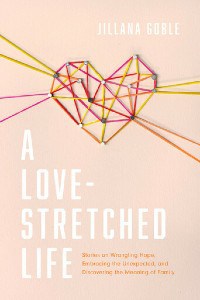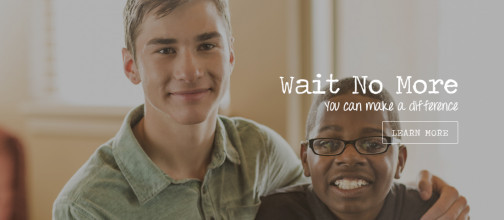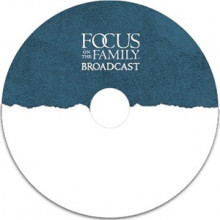Preview:
Jillana Goble: I love the verse that you quoted, Jim, about the Lord being close to the brokenhearted. And I just think we have the privilege of being close to the brokenhearted. And that has also, um, made me feel closer to the Lord, um, through that privilege of walking in the midst of the mess and the muck. Um, it has really been the most transformative discipleship tool that the Lord has used in my life, um, by being in proximity to those with different stories than me.
End of Preview
John Fuller: That’s Jillana Goble describing some of the unique challenges that moms and dads face when they follow God’s call to become foster parents. You’ll hear more from Jillana today on Focus on the Family. Thanks for joining us. I’m John Fuller, and your host is Focus president, Jim Daly.
Jim Daly: You know, uh, we had, I always say this on day two, what an amazing conversation we had last night, but it was-
John: It really was.
Jim: … an amazing conversation.
John: Mm.
Jim: And it, uh, was the good, bad, and the ugly of getting engaged in foster care and helping these children to do better and ultimately, helping the parents too. It’s one of the additional benefits. And man, again, for Christians to be engaged in that environment, it’s so critically important. The need is huge. Just to paint that picture, there’s about 400,000 children every year that need foster te- hopefully, temporary foster situations. And then it’s the idea of reuniting those children with their biological parents. About 100,000 of those children, uh, the parental rights will be terminated, and those children are looking for adoption opportunities.
John: Mm-hmm.
Jim: And that’s where Wait No More, really we aim for that area specifically, but we also are able to equip, uh, parents to think about fostering, respite care, which we mentioned last time. That’s the idea of just providing help to a family that’s fostering or a foster/adoption family. So, we covered a lot of ground, and it was wonderful. Jillana’s story, it reminds of a quote I read from an educator named Rita Pierson. She said this, “Every child deserves a champion, an adult who will never give up on them, who understands the power of connection and insists that they become the best they can possibly be.” And, uh, Jillana and her husband, Luke, certainly embody that. I think my wife, Jean, who is with us again today-
John: Mm.
Jim: … embodies that. Uh, and it really could be everybody’s story. And if you’re looking to do scripture, this (laughs) is an area where the field is white unto harvest. So I’d encourage you to lean into this. It really will equip you to think about, uh, your role in the foster system.
John: Yeah. As you said, Jim, uh, the first part of our conversation was riveting, and we really wanna encourage you to listen to that or watch it. And we’ll have links at our website along with details about Jillana’s book, A Love-Stretched Life: Stories on Wrangling Hope, Embracing the Unexpected, and Discovering the Meaning of Family. What a terrific resource, and you can learn more at focusonthefamily.com/broadcast.
Jim: Jean, Jillana, welcome back for day two.
Jillana: Thank you so much.
Jean Daly: Thank you.
Jim: (laughs)
Jean: It is a pleasure being back.
Jim: Are we gonna have dinner tonight or what?
Jillana: Yes.
Jim: (laughs)
Jillana: We are.
Jim: I’m looking forward to that. Hey, uh, what a serious topic, but also, uh, an encouraging topic too. There’s so much kingdom work that could be done in this arena. Uh, Jillana, tell us about your son, Charlie, and how did you first meet him? And what were the circumstances that led you to adopt him? I mean, this is the real commitment. Some of the audience, they’re thinking, “Wow, what? You met your son and you adopted him?” Just speak through those emotions and what you and your husband, Luke, thought about.
Jillana: I would love to share the story, and I have his permission and others’ that I’ll be mentioning to share this snippet of his story. Um, so my husband and I have two small biological daughters. At this point, we have just adopted our son, Micah, um, after a long stretch of relationship with his beautiful birth mom, and we were not on the list to get the hotline call saying, “After hours or on weekends, can you please just temporarily foster?” However, we did get a call. Um, and I’ll be honest, my husband is not a big video game player, but he was at our neighbor’s house playing video games (laughs). And I went to him and I said, “Hey babe, there’s, there’s, uh, someone from the Multnomah County Hotline on the phone. They have a baby at the hospital that needs to be picked up. Do you think we could do that? It would just be for 48 hours.” And with barely looking away from the screen, he’s like, “I think you can do anything for 48 hours.” So I gave a very-
Jim: (laughs)
Jillana: … enthusiastic yes. And little did we know that that 48 hours is now, much to our delight, he is now our almost 12-year-old son who never left.
Jim: Oh, wow.
Jillana: However, we thought we were making a two-day commitment. Um, we picked up Charlie at the hospital. And gosh, on the outside, he just looked like such an adorable, typical baby. To make a very long story short, his parental rights were terminated at two. We had the privilege of adopting him. And then shortly after his adoption, Charlie just began falling pretty significantly away from developmental milestones. And I talked to professionals, and they kinda just assured me that there’s a wide continuum, which I knew. I’d parented three kids at that point. And yet, my mama’s gut was like, “There’s more here than meets the eye.”
Jim: Mm.
Jillana: And it wasn’t until I did a deep dive into prenatal alcohol exposure that I realized that Charlie did have fetal alcohol syndrome, and he later got a formal diagnosis. And while this is a spectrum in which some kid can be prenatally exposed and can function quite typically, others, this has a daily effect on every moment of their lives, and-
Jim: Describe some of that for us just to paint that picture, ’cause we’re not experienced in that. What does that look like?
Jillana: Well, sometimes it can look like kids being really dysmature, meaning their age, their chronological age and their developmental age don’t match up.
Jim: Mm-hmm.
Jillana: So for example, Charlie’s almost 12, but if you took kind of what a typical developing five-year-old needed assistance with, that’s kind of still where we’re at-
Jim: Right.
Jillana: … with him. A lot of kids with FASD are kind of at a, at a pot that’s at a constant boil, and you never know wha- what pebble thrown into the pot will cause some pretty intense dysregulation. I think, um, I like to say that Charlie, the essence of Charlie is sweet. The essence of Charlie is creative. The essence of Charlie is loving and kind, and also, that is often covered up with a very prickly porcupine exterior-
Jim: Hmm. Yeah.
Jillana: … um, that, uh, is very off-putting to a lot of people because, um, he, uh, uh, his engagement with others and with the world i- is pretty limited.
Jim: You know, some people are hearing that and go, “Wow, okay. You really wanna jump in the deep end of the pool like that?” What do you say to them when I’m sure you’ve had friends say that, “Wow, you and Luke are really taking on a lot”?
Jillana: To be fully honest, we said yes to a, a baby in 48 hours, and that tumbled into long term. And then when we adopted Charlie, we really, he was still pretty typically developing. It was post-adoption. We still would’ve adopted him had we known, but it’s just a different path for families to begin to say, “Oh gosh, this was the path I thought we were taking, and we knew it wouldn’t be easy, but it’s actually exponentially harder than we could’ve even imagined.” And yet, difficult does not mean not worthy. And I feel like that is where God has met us in the midst of a lot of our expectations kind of tumbling down like dominoes. I honestly thought, Jim, like, “Oh, I’m easy-breezy.”
Jim: (laughs)
Jillana: Like, I didn’t ever have a, you know, like, a pre-expectation of what my family was gonna look like until in my humanity, we get to moments in parenting Charlie where I’m like, “I thought I didn’t, but guess what? This right now in this moment is not it.” And I actually had expectations that I didn’t realize that I had.
Jim: Hmm.
Jillana: And, um, and yet I can’t imagine my life without him, but it has certainly changed my lens on, um, on seeing the others-
Jim: Yeah.
Jillana: … with invisible disabilities. That’s part of the challenge is that it’s not, uh, visible, so therefore, people engage with Charlie in a typical manner, and he just needs a lot of accommodations.
Jim: Yeah. That, um, statement that is said from time to time, “Oh, you must be a hero. You must be an angel. You must be a saint. I could never do that.” Um, how does that make you feel, and is it even true?
Jillana: It’s certainly (laughs) not true.
Jim: (laughs)
Jillana: Ask anybody who knows me really well, they would not, um, describe me as a hero. I think (laughs)-
Jim: I’m sure you’re a good person. I think the point there is people will use that-
Jillana: Yeah.
Jim: … as a deflection of their own responsibility.
Jillana: Well, absolutely, Jim. And people have said to me over the years like, “Oh, God gives special kids to special people.” Oh, you know, and I, I have to have humility and grace because I think if I hadn’t lived this journey, I might be one of those people that would’ve sa- unknowingly-
Jim: Totally get it.
Jillana: … said something-
Jim: Yeah.
Jillana: … like, unintentionally like that. But now that I’m here, I think for those of us on the receiving end, it can often feel extra lonely because it’s like, wait a minute, I’m an ordinary person putting one ordinary foot in front of the other, trusting God, trying to have community, trying to be educated to love my son and rise him up to the highest level of his capability, whatever that may be. And this is tough, and this is hard. And God did not create us with finite capacity, and that is a message that I think, yes, we have Jesus. Yes, hopefully we have a good church community. Yes, we have others who, quote, unquote, “get it,” which is priceless on this journey, but that doesn’t mean that that somehow overrides the way that God has made us with finite capacity. And I think that that in the conversation of foster care and adoption is a needed conversation about how we need to be taking care of ourselves, so to speak, to be able to be the parent that these kids need, ’cause it takes a lot out of us.
Jim: It does. I think the other realization is this, uh, kind of American trait where (laughs) we’re very self-reliant, we can do it. The pioneer spirit kind of.
Jillana: Yeah.
Jim: Um, yet in foster, that doesn’t work well. Uh, you’re not gonna be able to do this alone, and Jean, you, you had that experience where friends were able to come alongside us and help us, not always. I mean there were times when we had a lot of trips we had to take, and we had to scramble to get coverage and things like that. But describe the importance of people coming alongside you and that foster family to take some of the burden.
Jean: Oh, it, it was (laughs) so important, especially, uh, at a time when the sibling set, he was a, uh, the little boy was preschool, and it was so helpful to have friends, to have Focus on the Family employee spouses who would take this little boy.
Jim: Dena Fuller, actually, Dena helped.
John: Mm-hmm.
Jean: Absolutely. To take this little boy for a few hours-
Jillana: Mm-hmm.
Jean: … and whi- so I could go to a doctor’s appointment or a hair appointment or go on a walk or just have time to yourself to get replenished.
Jim: Yeah, it’s so critical.
Jean: It was really important. And, Jim, you alluded to those who are not licensed as foster care providers could not provide overnight assistance.
Jim: Right.
Jean: So that was more challenging. We had a family missions trip-
Jim: Right.
Jean: … that, a international trip that we could not take the children on, and, and that was challenging. But we were very fortunate to have a faith community come around us.
John: Mm-hmm.
Jim: Yeah. Jillana, also, your observations with that, uh, the lack of and when it did happen correctly, when couples did come around and help, how refreshing that is.
Jillana: Oh, I think that kind of we’re all in it together, it, it really makes that old adage of it takes a village come to life-
Jim: Mm-hmm.
Jillana: … when others are coming around you. I think one of the biggest myths in our society and also prevalent in the church is that, like, I can go it alone. You know, I’m gonna be dependent on God, but I don’t wanna be interdependent on my neighbors, on my family, on my community at large. And I that foster care and adoption really invites you to leave that myth behind. It can be really challenging because we wanna, we all want to be the ones that are the givers and not the ones that are in need of help, right?
Jean: Right (laughs).
Jillana: And yet th- like, oftentimes, I think that’s where God meets us, that’s where God wants us, that’s where, um, humility of like, in order to the be the best parent I can be, I actually need to reach out for help. And though I want others to perceive me as self-sufficient or whatnot, I need others to be the best parent I can be in this moment.
John: Mm-hmm.
Jim: Yeah. It’s so good. And, uh, I, I just wanna give an example. Then I’m gonna ask you about a story that you have. But, uh, Wait No More is the program here at Focus. That started not quite 15 years ago, I think 2008. And there’s been some tremendous, uh, stories come out of that. But just the other day, a former colleague of ours, Kelly Rosati, who used to head up the program, sent me a text and Jean a text. And, uh, you’ll, you’ll remember this from the other day.
Jean: Mm-hmm.
Jim: And it was simply this, uh, “Thought this would encourage you both. This Wait No More Colorado kid was found in a basement with no food, no water, horrible abuse and neglect. He was adopted by w- a Wait No More Colorado family, and the little boy…” Chokes me up. “… is now a man headed to college.”
John: Mm.
Jim: It’s good hear the great things God has done.
Jean: It’s beautiful.
Jim: It just-
John: Mm-hmm.
Jim: That’s what you’re aiming for.
John: Mm-hmm.
Jim: It’s never gonna be perfect. It’s gonna be messy as can be, but look, this little boy was snatched from the jaws of the evil one.
John: Mm-hmm.
Jim: I think the Lord’s happy with that-
John: Yeah.
Jim: … really. Uh, Jillana, you have another story you shared last time about Jennifer. We talked a bit about her struggles. Um, I think she had four children who ended up in foster care. Again, you gotta be patient with repetition. I mean, these are, uh, deep learnings that they have from very dysfunctional backgrounds. Um, she had those four children. You adopted her third son, Micah, and have cared off and on for his younger brother, Elias, I think.
Jillana: Correct.
Jim: Uh, how is Jennifer today? What are the kids doing (laughs)?
Jillana: Oh my gosh.
Jim: And what’s happening?
Jillana: Well, I am so pleased to report that in this moment in time Jennifer, um, is seven and a half years sober. It’s the longest time that she’s been sober s-
Jim: What a victory.
Jillana: What a victory. I mean, in capital, glittery lights, what a victory. It’s the longest time since she was a preteen, um, and she, she just turned 40. Sorry, Jennifer.
Jim: (laughs)
John: Whoops.
Jillana: I do believe I have your permission to say that.
Jim: (laughs)
Jillana: But I’m just so proud of her. It just shows how long she’s been in her addiction.
Jim: Yeah. Good for her.
Jillana: And, um, you know, I think there’s, like, this never say never because it’s so oftentimes that, that stumbling and falling is a part of recovery, and that’s really hard to bear witness to. And so, you know, we were, we’ve been rooting for Jennifer for a long time. And her fourth child came, and then we were court ordered to return him to the treatment facility where she was. And kind of, my husband and I and our family were there at her treatment graduation, the only ones, and moved her into Second Step Housing. And what do you know, addiction came along again, and it almost felt like at some times we were riding this carousel of craziness, like, are we ever gonna get off of this thing? And yet, on the way to taking her baby to her at the treatment facility, I passed this old church kiosk with faded letters that were kind of askew and it said, “As long as there’s breath, there’s hope.”
Jim: Mm.
Jillana: And I really, I just stared wearily out the window and was like, “Okay, as a Christian, we are called to be people of hope. Do I really believe that? Do I really believe that that actually pertains to the mom that grew up her entire life in foster care is four for four for her kids being child welfare involved? Does it apply then?” And what God has been so gracious to show me through my relationship with Jennifer, through the privilege of being in relationship with her, is that yes, there is hope.
Jim: Mm-hmm.
Jillana: There’s still hope. And so, we have had the privilege of actually caring for Elias two times and returning him. The last return was, um, seven years ago and, um, she’s still a part of our family. And we still have the ability to, uh, root her on. And like I said, she’s, she’s over at my house quite a bit. We speak monthly-
Jim: Mm-hmm.
Jillana: … to state caseworkers. We do sharings at conferences, um, about kind of this unlikely relational bridge that we’ve built, often in the fog, and oftentimes entire planks have been missing where we felt like we’ve kinda had to jump to the other side. But we’ve always continued, even in, even when we’ve had to be cautious, even when we’ve been angry. We might not be sprinting towards one another, but our backs have never been completely turned-
Jim: Mm-hmm.
Jillana: … from one another. We’ve always had our posture turned towards one another, even in times when out of tough love I’ve had to set tough boundaries and have not been in constant engagement with her.
Jim: Mm.
Jillana: But it has allowed us for the last 15 years to, honestly, become different people through the privilege of being in proximity to her.
John: Mm-hmm.
Jim: That’s so much the picture here, right? I think Jean and I experienced that. We’re better people because we were engaged with foster.
Jean: Absolutely.
Jim: Mm.
John: Yeah, the hard work of caring for these children, their families, uh, of showing up and letting go of expectations, of trusting God with that hope, uh, that you mentioned is so vital. And, uh, this is Focus on the Family with Jim Daily. Our guests are Jean Daly and, uh, Jillana Goble. Jillana has captured a lot of her story, uh, and her perspectives in a book called A Love-Stretched Life: Stories on Wrangling Hope, Embracing the Unexpected, and Discovering the Meaning of Family. And we’ll encourage you to get a copy of that when you call 800, the letter A, and the word FAMILY, or stop by focusonthefamily.com/broadcast for more.
Jim: Uh, Jillana, you had a, uh, a ministry, uh, I think it’s somewhat coming from the book as well, uh, Embrace Oregon and Every Child Oregon. Uh, describe what that’s about and what you’re doing with that.
Jillana: It came about very unexpectedly. It came about through, uh, an organic relationship that I had with my certifier, which in Oregon, that’s the person that comes to your house and does your safe home study and makes sure you have a fire extinguisher.
Jim: (laughs)
Jillana: And I merely just asked her one day, “You know, what happens when kids are removed from whatever situation and they’re waiting in a government office, what happens then?” And she just painted this picture of scrambling each and every time, and I thought, “Oh, that is such an opportunity for my community, for my church to get on board with offering something tangible.”
John: Mm.
Jillana: So that’s where welcome boxes came in to give kids things that are brand new and their own to occupy them in this time of waiting. And then from there, I often like to say, “God, uh, you know, used a simple box to call the community outside of the box to begin to say, ‘What else can I do?’” And that’s eventually what led to what is now called Every Child, which is a statewide turned national movement of how do we come alongside, um, foster parents and kids. We also include caseworkers saying, you know, they are oftentimes really unsupported.
John: Mm-hmm.
Jillana: It’s not always a popular view. People can have very particular feelings about caseworkers, and yet, like, we cannot say as the church, the capital C church, that we’re gonna abdicate our responsibility to those wearing government badges-
Jim: Mm-hmm.
Jillana: … to care for our most vulnerable kids. So how can we come alongside, and how can we invite those, um, those in the faith community, those for the common good, how can we say, how are we on team vulnerable children together? And that’s really the heartbeat of Every Child.
Jim: And Jillana, another thing that you’ve involved yourself with, which I thought was a great idea, it’s that refurbishing the, the visitation rooms that families use, uh, at these adoption agencies. Speak to that. That one was fresh for me. I hadn’t heard this.
Jillana: Yeah. You know, I think about, um, how families usually get an hour or two to be with their kids. And they’re digging out of a pit of domestic violence or addiction or what have you. And this is sacred space for these families. We want them to be in a place that uplifts them, that communicates dignity, worth and value, and not just kinda shabby leftovers. And so really, our heartbeat was, what would it look like if area faith communities combined with businesses, got together to make sure that those places where families were coming together once a week were places that they actually wanted to be, where parents could actually envision, when I hopefully get my kids back, I wanna create a space like this, this home, cozy environment. And so, uh, we have remade over quite a few of the child welfare offices all over the state of Oregon, and we’ve also done that for the staff break room to try to bless them and to say, “Hey, we see you. We support you. We know this is a thankless job, but we are seeing what you’re doing and saying thank you by also wanting to give you an environment that is uplifting for you as well.”
Jim: That’s a great idea-
Jean: I love that.
Jim: … you know, just blessing them. How ’bout that? Another thing that we should do as the body of Christ. Uh, right here at the end, let’s, uh, give you both a shot with your mothers’ hearts (laughs)-
John: Mm-hmm.
Jim: … for these children in foster care. Why should Christian families consider getting involved? The sales pitch is here.
Jean: Because again, if not us, then who? These children, by no fault of their own, have been removed from their homes, often in the middle of the night, often traumatically, or probably always traumatically, and usually taken immediately to a stranger’s house.
Jim: Mm.
Jean: The body of believers, we need to step up and provide one of those safe and loving homes. And I would say that, to someone, if you’ve considered foster care, then absolutely look up a local agency in your community and start that licensing process. If you’re someone who is unsure if you would be able foster, I love to encourage people to begin with respite. I think in most states and maybe all states, you can provide up to four hours of respite care for a foster family without being licensed. And this has a tremendous value for the foster family. It allows them to have a break or go to those doctor appointments or go to a lunch, but it also is really a great way to get introduced into the foster care world. There are so many ways that people can wrap around foster and adoptive families. I know that t- I’m involved with a local agency here in Colorado Springs that, you know, I rally people to help provide Christmas and holiday-specific gifts for the children in foster care. There are myriad ways-
Jillana: Yeah.
Jean: … to wrap around-
Jim: Yeah.
Jean: … and get involved.
John: Mm-hmm.
Jim: Jillana, your mother’s heart, you know, why? Why should we think of this? I’ve got a lot to do, Jillana.
Jillana: (laughs)
Jim: I’ve got my own kids. I’ve got a career, church obligations.
Jillana: Yeah.
Jim: I mean, this is a lot.
Jillana: It is a lot.
Jim: (laughs)
Jillana: And I would say it is a lot, and we shouldn’t go into it lightly. You know, foster care gives us the invitation to spin into disequilibrium, and we don’t want that. We want our families to be safe, healthy families, and yet it’s worthy. Like, difficult and worthy are not mutually exclusive. So if our families are in a place-
Jim: Hmm.
Jillana: … where we feel like we can absorb a little bit of extra impact, then there’s always a need. And if we’re not, then like you said, we can always find different ways to plug in. We’re not all called to do the same thing. I truly do believe that in God’s economy, we give what we have. And all those little things that different people can give in different ways add up to a collective whole that is, that can be truly astounding. Um, it’s not a question of need in your community. There are kids in need in your community, and yet, um, you don’t have to do fostering. But what would it look like to wrap around a family that is doing fostering? I love the work of Wait No More and how that’s a consistent message of like, you don’t have to do this thing, but what thing can you do-
Jim: Mm-hmm.
Jillana: … to be a part of it, to be on team vulnerable child?
Jim: It, what, what strikes me is it’s a- a- actually organized for us already. We don’t have to go out on the street looking for where’s the opportunity. (laughs) Foster care is there, and it’s organized.
John: Mm-hmm.
Jim: You just need to step in and provide your time and your love and your commitment to these kids. And, uh, think of it that way. Well, listen, this has been great. Uh, I hope people are motivated to check it out. Why don’t you start there and start praying about it and just say, “Lord, what do you think I should do?” (laughs) I think you’re gonna hear the Lord speak to your heart about it.
John: Mm-hmm.
Jim: And, uh, that’s a good challenge, I think. And I want to say thank you to both of you for being with us. This has been really good. Thanks.
Jillana: Thanks so much for having me.
Jean: Thank you so much for having me. It’s been wonderful being on the broadcast with Jillana. Uh, I enjoyed your book so much. This is a really important topic, so thank you.
Jim: Yeah. Jean’s a good barometer of book reading.
John: Mm.
Jim: I think you listen to a book a night, basically.
John: (laughs)
Jim: But, uh, so good. And Jillana, thank you for setting an example for others to follow. That’s a good thing. You’ve written this great book, A Love-Stretched Life, and we wanna get it into your hands. Uh, make a gift to Focus on the Family for any amount, and we’ll send it as our way of saying thank you. If you could do it monthly, it really helps. A one-time gift is, is helpful as well. So either one is terrific. And again, we have a year-end match. Uh, some of our friends have said, “Yes, we’ll have some fun and we’ll challenge people to donate.” So your, uh, gift will be matched dollar for dollar. If you make a $50 gift, it’ll be matched with an additional $50 gift. And, uh, don’t be offended. It’s just a fun way and encouraging way to spur giving on, and the good news is, uh, this goes right back into ministry. I’m proud to say we’re at about 95% of your dollar goes to ministry. Uh, we’re not covering kind of the general, uh, expenses and fundraising costs. Only about, uh, five cents will go to that. So that’s incredible at the level that Focus is at now and that 95% of your dollar goes right into ministry.
John: Mm-hmm. Yeah, donate today as you can. Request a copy of this book by Jillana called A Love-Stretched Life, and find out more about our Wait No More program, which is all about wrapping around foster care and making a difference. You can get involved when you call 800, the letter A, and the word FAMILY, or we’ve got all the details at focusonthefamily.com/broadcast. Well, coming up tomorrow, some encouragement for moms from Heidi St. John.
Preview:
Heidi St. John: Moms need to know that. On every, every day is a new opportunity for God to show his grace and his mercy, and it’s everywhere.
John: On behalf of Jim Daly and the entire team, thanks for listening to Focus on the Family. I’m John Fuller, inviting you back as we once again help you and your family thrive in Christ.
End of Preview


















